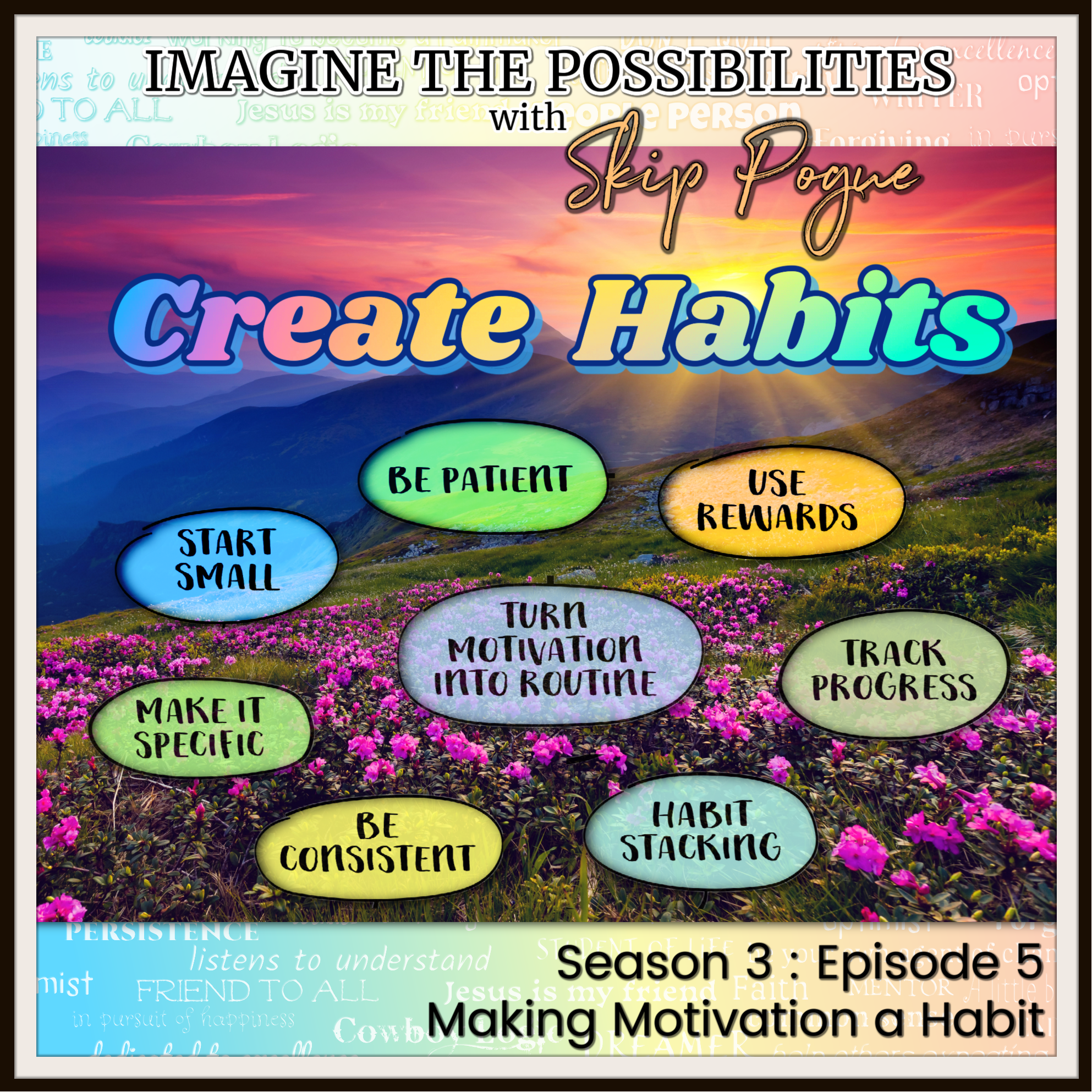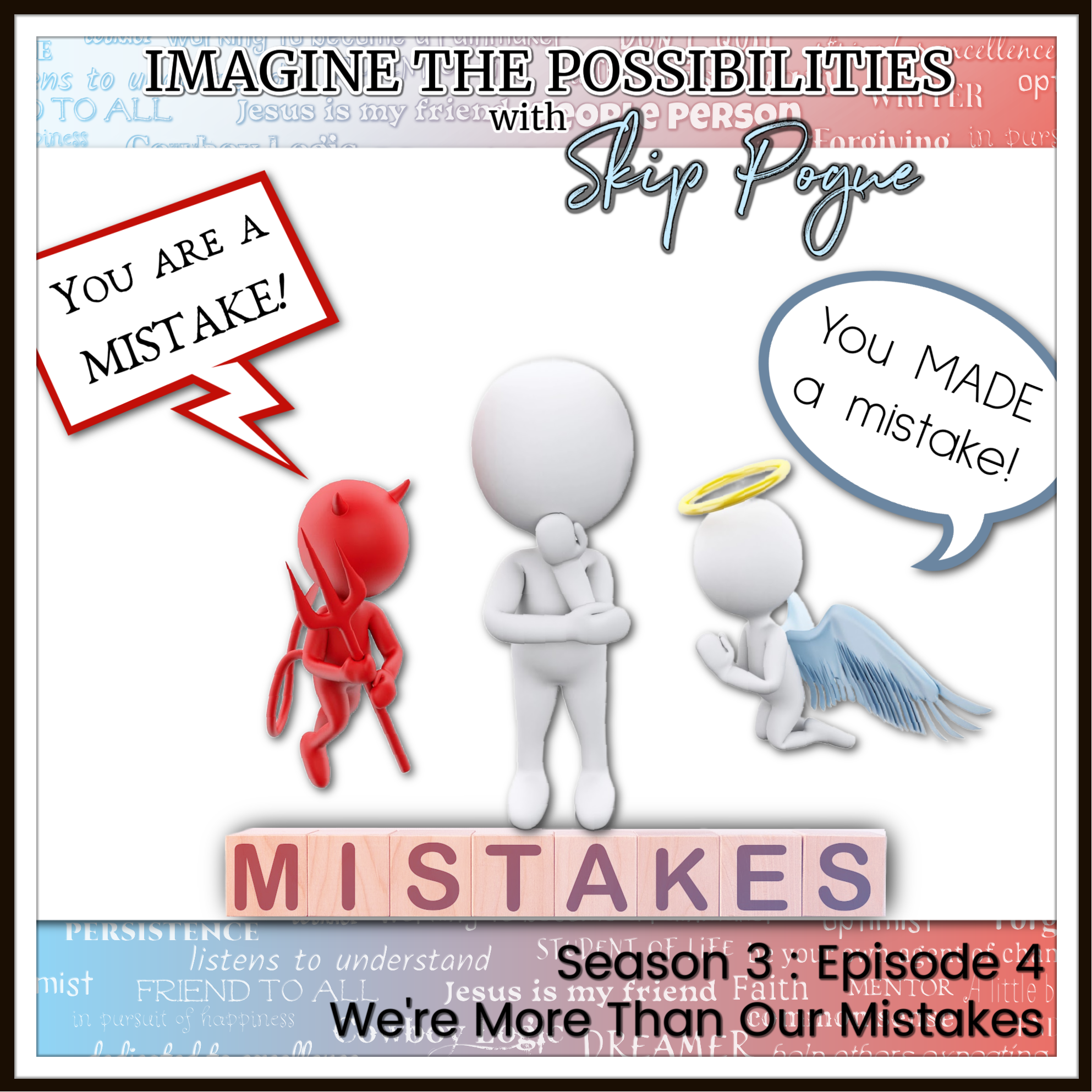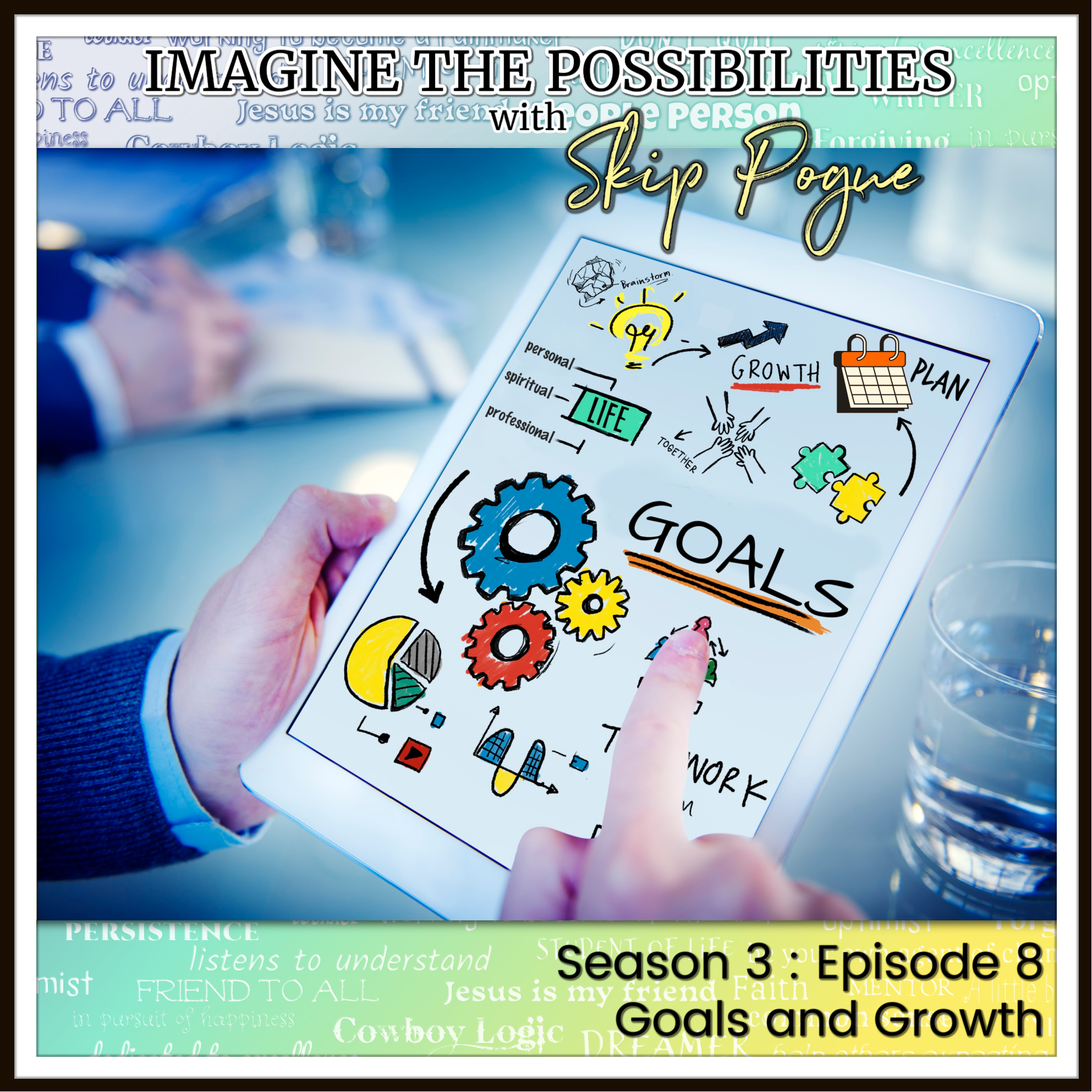Today we’re talking about something we all struggle with — staying motivated. We start strong, but before long, the excitement fades, and the goals we set feel harder to reach. In this episode, I share why motivation alone isn’t enough and how turning it into a habit changes everything. We’ll explore simple steps like habit loops, stacking, and baby steps that help us stay consistent and build momentum. Together, let’s learn how to make motivation a lasting habit that fuels true success.
View Full Transcript
Episode Transcript
[00:00:12] Hello, and welcome to Imagine the Possibilities. My name is Skip Pogue. Today's episode is titled Making Motivation a Habit.
[00:00:22] Motivation by itself isn't enough, but how can we make it better? We need to make motivation a habit because doing so will lead to lasting success for us. And that's important, right? That's the reason we want to stay motivated to be successful.
[00:00:39] Have you ever been super motivated to start something and maybe a week or two later you're not all that excited by it?
[00:00:47] Because I have. I think most people have.
[00:00:50] Well, we're going to talk about that. We're going to talk about why motivation fades and what we can do about it. We're going to talk about the science behind forming a habit, how can we turn motivation into an automatic habit, and then some strategies and personal insights that we can use moving forward.
[00:01:11] One of the things I want to accomplish with this episode is that by the end of it, that you'll have a guide that will help make motivation a lasting part of your life.
[00:01:21] So let's get started.
[00:01:24] One of the first things we need to think about motivation is motivation is an emotion, and it's a temporary emotion. It changes with our moods, our energy levels, and even the circumstances we're involved in.
[00:01:41] Let's talk about an example. You wake up one morning and you're all excited about the workout you're going to do that day, but the next day when you wake up, you're tired and your motivation disappeared, so you might not even do the workout. The rub in all this is that if you only take action when you feel motivated, you won't ever be consistent. I did a podcast on New Year's resolution, and one of the things I realized was this thing I'm talking about feeling motivated one day and not the next is why so many people wind up abandoning their New Year's resolutions after just a few weeks. I like this quote. James Clear said that we don't rise to the level of our goals, we fall to the level of our habits, meaning we need to have great habits to reach our goals, and motivational habits is one of them.
[00:02:39] I realized that motivation gets us started a lot of times, but discipline and habit formation are what keeps us going.
[00:02:48] There's a science, I guess, at least when I did the research on this, I discovered there's a science about habit formation. Habits are formed through a cycle called habit loops.
[00:03:00] There's a trigger associated with that, and that trigger reminds our brain to start a habit. The routine is an action or behavior that we need to make a Habit out of. The benefit to all this or the satisfaction we derive from it is that it ultimately reinforces the habit. That's the whole point in it. It's like we wake up in the morning, we have a cup of coffee, and by having that cup of coffee, we feel more alert and ready to start our day. That's what I do. I get up morning, I get ready, I go fix myself a cup of coffee, I sit down and. And after drinking my coffee, I do feel more alert and I do feel more ready to start the day.
[00:03:44] Here's the thing. If we can make motivation a habit, we don't have to rely so much on willpower. The more we repeat a behavior, the stronger the habit becomes.
[00:03:56] The thing is that we've got to be conscious of the fact that that's going to happen and make sure our behavior is pure, positive and powerful. Not a bad habit, but good habits. I guess a good example that would be athletes who don't. They don't wake up every day wondering if they feel like training. They're conditioned to do that, and they do it regardless of their motivation.
[00:04:22] It's a habit for them, and they just do it.
[00:04:25] So now the big question is, how do we turn motivation into a habit?
[00:04:31] I talk about baby steps often, and that's one of the things we need to do. We need to take baby steps to do it. Because if we try to do too much at once, we'll just burn out, we'll quit, we won't complete the task we've set before us.
[00:04:47] It's like, if you want to start exercising, let's say you want to start walking, you need to start out slow, maybe just five or 10 minutes the first day, maybe five or 10 minutes the first week. And then move it up, say maybe 10 minutes to 20 minutes or 25 minutes, and then do that for a little bit, and then move it up again. And you can finally reach the point that you're probably walking an hour or maybe even up to an hour and a half, two hours. You've done that with baby steps, and it's become a habit.
[00:05:24] And that's great.
[00:05:26] You did it.
[00:05:27] It's kind of like if you read.
[00:05:30] I love to read, everybody doesn't. If you want to read more, commit to reading two pages a night, maybe five pages a night, just a few pages. Say you got a book, 400 pages, and you say, okay, I want to read this book, but can't. I don't know how to finish the book. I have a hard time doing that. Well, just read a few minutes, five minutes, ten minutes, few pages. If you keep doing that, you'll get successful at it. It will become a habit. You'll sit down and you'll read your five pages and you think you'll just automatically read 10 pages. Then you'll be at 15, then 20 and all of a sudden you've read the book, there's a story, and I think it's the same James Clare told it that it was about a man who started going to the gym and he went for just five minutes. But over time going to the gym became a habit for him and his workouts got longer and they got longer and longer because it was a habit. He's going to the gym and he winds up instead of working out five minutes, he may wind up working out for an hour.
[00:06:43] And that's great.
[00:06:45] I think we've got to remember in this habit forming thing that success is about consistency, not intensity.
[00:06:55] Start small and let the momentum build. That's what you have to do. That's what we've got to do.
[00:07:01] There's another thing I discovered and I probably do it and you probably have too, but I didn't know what it was called.
[00:07:09] Habit stacking. It's like if your brain's already following some routines, then let's just add the habit to one of those.
[00:07:18] We talked about brushing your teeth. What about after I, what about the habit of doing this? What about I say, okay, after I brush my teeth, I'm going to write down one goal for the day. And we get in the habit of doing that.
[00:07:32] Maybe we keep little post it notes and a pen in, in our bathroom. So we get done brushing our teeth and do all the rinsing and everything. And then we look over and there's this colored post it note, maybe bright orange or something. And we write down one thing that we want to accomplish that day. One goal for the day.
[00:07:53] I've set a goal recently to do this before I drink my morning coffee, my first cup of coffee, I've got a Keurig coffee maker. So I get it ready, it has water in it already. Get everything ready, start the Keurig. And it takes, I don't know, 30 seconds, maybe a minute to brew a cup of coffee. So while it's doing that, I'll read one inspirational quote.
[00:08:19] I have a whole list of them. I can make them randomized and so I pick one out from the list. I mean, one pops up on my phone screen and I read that quote and that's a good thing. I like them and it's easy enough to do it.
[00:08:37] And that's what habit stacking is. If you've got something you do that you know is a habit, brushing your teeth, washing your face, drinking a cup of coffee, whatever it is, stack the next thing on top of that.
[00:08:52] If you enjoy praying or meditation and it helps you stay motivated, do it right after you wake up. The whole point in this is just we need to tie habits to things we're already doing.
[00:09:06] Instead of trying to force ourselves and force them into our schedule, we need to make it easy and remove barriers.
[00:09:15] If something's too difficult for us, we won't do it. We'll avoid it sometimes at all cost. We just will not do it. But let's say working out motivates you.
[00:09:27] Set out your gym clothes the night before. Set them somewhere. When you wake up, you're going to see them and that'll help you get motivated. If listening to motivational podcast helps you then set one to autoplay. Let's say you got your Alarm set for 6:30, set one to autoplay and at 6:40 on your phone or whatever. And if you really enjoy listening to them, then that'll help you stay motivated or get you motivated for the day.
[00:09:56] You can set it to autoplay my podcast. That'd be great.
[00:10:03] The thing is, in both those examples, if we do that, we're more likely to do whatever that is, whether it's go to the gym or listen to motivational stuff. By making it more automatic and removing certain barriers like you don't have to go searching for your gym clothes. Just an idea, how can we keep track? We can manually do it on a calendar. If there's certain things, just write on your calendar or write it on a post it note and stick it over that day. What you did, what you did in your habits to become more consistent. Or get a habit tracker for your phone.
[00:10:39] I've got one on mine and I really like does a good job. It allows me to track multiple things.
[00:10:47] I like that part of it. And it's consistent in the fact that you can see it. It's visual because when you mark it off, the little square lights up.
[00:10:57] Oh man, this is cool because I did this 27 times in a row already.
[00:11:03] And you can set goals within the tracker to, to let you know when you've crossed certain milestones and stuff. So it's pretty cool. Try a habit tracker. I find that even though I feel like I'm a highly motivated person, there's times my motivation does fade But I feel like seeing that visually and seeing a consistency that it makes it harder for me, even if I'm feeling bad or something to miss a day, just something to think about.
[00:11:32] We need to surround ourselves with motivated people.
[00:11:36] It really does affect us. If we are always hanging around with the naysayers and the negative people, then we're going to get that way sooner or later.
[00:11:46] But if we surround ourselves with highly motivated or motivated people, it turns out we'll stay more motivated because our environment, which includes the people around us, influences how we behave.
[00:12:00] Follow motivational people on social media.
[00:12:03] I'm on several places, but substack and Facebook come to mind.
[00:12:07] You can go to Facebook or substack, and substack is probably, if I had to say, a better choice.
[00:12:13] Follow me and you'll get notifications. When I do a podcast, different things like that vision board, so you can see it every day. That's the advantage, I think, of having a. A habit tracker on my phone. I can see it every day. It's on the first screen, I can hit the button and there it all is, whether it's exercising or reading or whatever. Find other people that enjoy the same thing.
[00:12:41] Join a group that shares your habit, like a running club, if that's one of your things, or a book club or whatever it happens to be. But I was in a book club at one point and it was really fun. The leader would pick a book every month that we would all read, and then we had at least one and sometimes two zoom meeting where we discussed the book and what we got from it. We did it as a group, and then we had breakout sessions where each of us, instead of 50 or 60 people, whatever it was, or 15, 20, whatever the number was, in a big group, we would break out into smaller groups of three to five people and we would discuss it between the five of us for maybe 15 minutes and then swap groups for another 15 minutes. And it was really interesting because we had some different views of what the book meant and what a certain character did and everything else. So it was fun doing that.
[00:13:39] In talking about all that, Jim Rohn says that we're the average of the five people we spend the most time with. And I believe that to be true. I don't know. And he, as far as I know, I haven't read the book. I just saw the quote. I don't know how much effect that really plays into things, if you know what I mean.
[00:14:01] The fact that we need to surround ourselves with good people. In our case, since we're talking about motivation. We need to surround ourselves with people that are highly motivated.
[00:14:12] Because like everything else, motivation is contagious. If we surround ourselves with the right people, motivation will become part of us. It'll become part of our lifestyle. And that's a really good thing.
[00:14:27] If we miss something, we don't do something because we're not motivated or whatever.
[00:14:33] We need to think about that. And it's like all the other stuff I've talked about.
[00:14:39] Missing a day is not a failure.
[00:14:41] That is, unless you quit. And then it is.
[00:14:45] So instead of saying, I failed, ask yourself, what can I change? What can I adjust to make sure I don't do that again? Look at working out. Say you skip a workout, then adjust. Just do five minutes of running in place, push ups, setups, whatever. Five minutes of movement. It won't replace the complete workout, but at least you will accomplish something in working out. And I did the thing about being a failure. And you're not a failure unless you give up. And that's a fact of the matter.
[00:15:21] And don't label yourself, oh, I'm a failure. Don't do that, please.
[00:15:26] I journal. I don't know how many people on here, I don't know how many people listen to this podcast journal, but I do.
[00:15:33] And if you miss a day, which I've done, just take and write at least a single sentence. Not say you can't write more, but at least a single sentence the next day. In all this stuff, and I've said this about goal setting and everything else, progress is not a straight line. It's a curvy road. It's got stop signs, it's got dead ends, it's got speedway roads and gravel roads, maybe even a dirt road. It's not a straight line, but we can get through it. We can progress through things if we just focus on it. Biggest thing to do about making progress is keep moving forward. Whether it's baby steps or you're going 100 miles an hour, just keep moving forward. We need to make our motivational things and our habits enjoyable. The thing is, and this is true, if we hate doing something, we may do it once or twice because we're forced to, but we're never gonna stick with it. It's like if you don't like going to the gym or even if you can't go to the gym, figure out what you can do something that's enjoyable for you. Maybe it's just taking a walk in the woods, or maybe it's sitting on the bank of a river. And not exercising at all. But it's enjoyable. It relaxes your mind, opens up you for other things and especially for motivation. If reading feels boring to you, try listening to audiobook or listen to podcasts. Charlie Jones said that we're the same people today as we'll be five years from today, except for the people we meet and the books we read.
[00:17:08] And I agree with that 100%.
[00:17:10] If you don't like reading, try listening to the audiobook. Actually, usually when I buy a Kindle book, because I use Kindle, when I buy a Kindle book, I'll buy the audiobook at the same time actually belong to whatever it's called audible. So I'll get both books. And the reason I do that is I like reading the book and listening to it at the same time. But then I have the Audible book that if I'm going to drive, say I need to go someplace, it's going to take me an hour and a half to get there. I'll put the audiobook, I've got them on my phone and I'll just hook the phone up the car and play the audiobook and listen to it. As much as I like country music, probably, probably better to listen to book just is, it's probably better if we make things enjoyable. Fun habits will stick with us longer. So if you can make it enjoyable, if you, if you can make it something you enjoy, do that because it makes it easier to form those habits and make sure the habits stick with us. I guess if we had, if I had to tell you some takeaways that I hope you get from this, the first one would be motivation faith. But habits stick with it. When it comes to building motivation habits start small. Stack habits and use rewards. The three things we've talked about and that'll help you build motivational habits, set up your environment for success. If we make motivation easy and we make it enjoyable, we're much more likely to do it and it's much more likely to become a habit for us. So make sure you do that.
[00:18:44] I guess the last what I would, I guess I'd consider these takeaways would be when you do have a setback, reframe it. Figure out what you can do to make it better, to get it completed, be successful with it and then do that and then keep moving forward. Here's what I'd like you to do. Pick one small habit to start today. Think about something that keeps you motivated and think about how can I make that a daily habit? What do I have to do to do that and then do it and start with another small habit or stack one on top of that habit and keep doing that.
[00:19:25] You will get to the point where motivation no longer fades, it's habits and they keep making you successful.
[00:19:34] So something to think about.
[00:19:36] I guess my closing message to you would be motivation is great, but when you make motivation a habit, success truly becomes inevitable.
[00:19:46] Motivation will drive the success and the success will drive the motivation.
[00:19:51] If you enjoyed this episode and you know somebody else that you believe it would help, I would appreciate it if you shared it with them.
[00:19:59] Thanks for listening to this. I really appreciate fact that you were willing to take some time out of your day to listen. If you've got comments or would like to be notified when the next podcast comes available, just go to Substack. The podcast is available there, but if you follow me on Substack, you'll get a notification.
[00:20:18] Remember that your future belongs to you.
[00:20:21] Stay humble, be kind, love unconditionally, laugh often, and enjoy life to the fullest.
[00:20:30] I hope that you have a super day and I pray that God blesses you in a super way.
[00:20:37] Thanks again and God bless.






